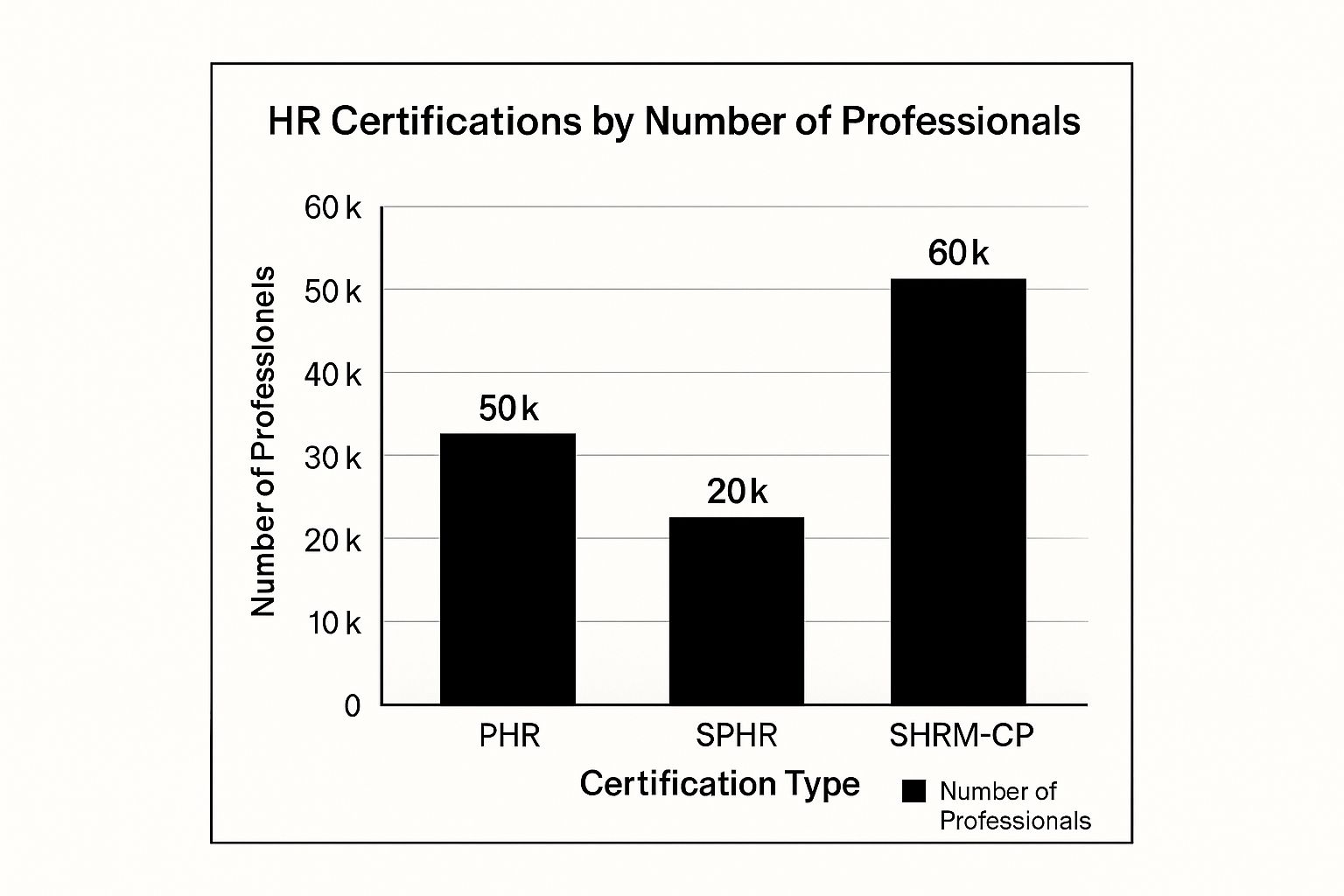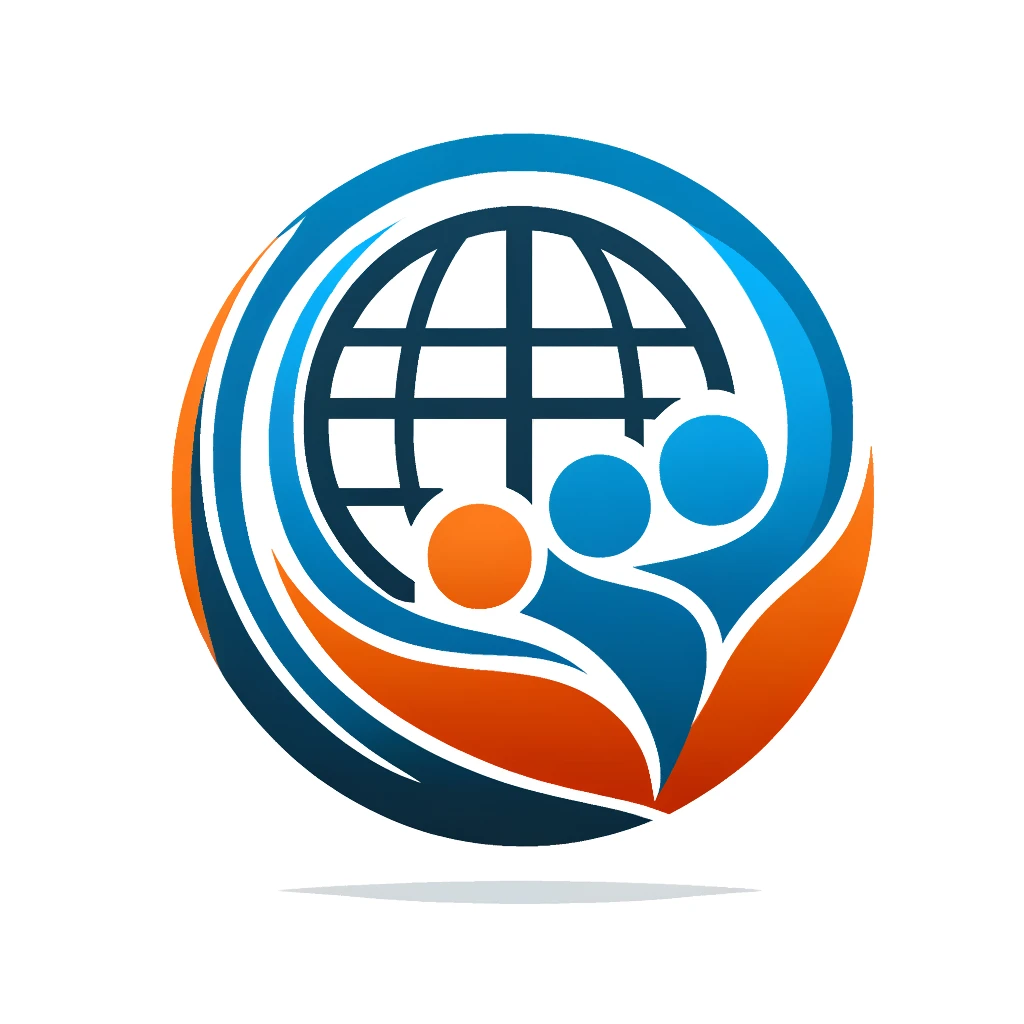Navigating The HR Certification Landscape

The HR certification world offers a wealth of possibilities. With a diverse range of credentials available, selecting the ideal path for your career journey can seem daunting. This section acts as your compass, guiding you through this exciting terrain and highlighting key certifications and their significance for various career paths. Are you striving for operational excellence or aiming for the heights of strategic leadership? The answer will illuminate the best certification for you.
Understanding The Key Players: PHR, SPHR, and SHRM-CP
Several certifications shine brightly in the HR field. The Professional in Human Resources (PHR), the Senior Professional in Human Resources (SPHR), and the SHRM-Certified Professional (SHRM-CP) are among the most widely recognized and respected. Each is tailored to a specific level of experience and career focus. The PHR often serves as a foundational stepping stone, concentrating on the operational aspects of HR. The SPHR, on the other hand, is designed for seasoned professionals with a strategic mindset. The SHRM-CP aligns with the SHRM Body of Competency and Knowledge, emphasizing practical, real-world HR competencies.
This means choosing the right certification requires careful self-reflection. Consider your current role and your aspirations for the future. Are you passionate about daily HR tasks like recruitment and benefits administration? If so, the PHR might be the perfect fit. If you aspire to lead HR strategy and shape organizational decisions, the SPHR could be the key to unlocking your potential. For valuable insights into industry trends and expert perspectives, visit Haekka's Blog.
Aligning Certifications With Career Trajectories
Understanding how each certification is perceived in the job market is essential for career advancement. Employers value different credentials depending on the specific industry and organizational needs. Some industries place a high value on specialized certifications, while others prioritize a broader understanding of HR principles. Recognizing these nuances can significantly enhance your career prospects.
Embarking on the pursuit of HR certification is a significant commitment. To illustrate the growing demand for certified HR professionals, consider the number of candidates pursuing credentials through the Human Resource Certification Institute (HRCI). In 2024, 5,422 candidates took the PHR exam, while 2,970 pursued the SPHR certification. These figures underscore the increasing importance of HR certification. You can find more detailed statistics here. This data reflects the significant demand for HR expertise across diverse disciplines. While the PHR emphasizes operational skills, the SPHR focuses on strategic capabilities. Both are highly valued, reflecting HR's growing strategic influence within organizations.
Furthermore, aligning your target certification with your desired career trajectory is paramount. This involves researching current industry trends and engaging in conversations with certified HR leaders. Their experiences and insights can offer invaluable guidance, empowering you to make informed decisions about your certification journey. This research can also reveal how employers perceive different certifications, providing you with a competitive edge. By understanding the landscape and aligning your certification with your career goals, you can navigate the HR certification path with confidence and purpose.
Meeting Certification Requirements (Without Getting Rejected)

The infographic above offers a snapshot of certified professionals across three common HR certifications: PHR, SPHR, and SHRM-CP. The SHRM-CP boasts the largest number, followed by the PHR and then the SPHR. This data provides valuable insight into each certification's popularity, a helpful factor as you explore the best path for your career growth. Understanding the unique requirements for each credential is essential to a successful application.
Decoding Eligibility Criteria
Before you begin your certification journey, take the time to understand the specific prerequisites for your chosen credential. For instance, the PHR and SPHR certifications, offered by HRCI, have distinct requirements for education and work experience. Often, these involve a combination of formal degrees and practical HR experience. Some certifications may require a bachelor's degree, while others accept equivalent work experience. Knowing these nuances is the first step towards a smooth and successful application process.
Documenting Your Experience Effectively
Your application is your chance to shine. Clearly documenting your HR experience is key to a successful outcome. This involves meticulously detailing your roles, responsibilities, and accomplishments. For the SPHR, for example, highlighting experience in strategic HR initiatives like workforce planning or organizational development is essential. Craft a compelling narrative that showcases your HR expertise. Remember, clear, concise, and compelling storytelling can make all the difference.
Addressing Qualification Gaps
Don't be discouraged if you don't initially meet all the qualifications for your target certification. Alternative pathways often exist. Some certifications recognize experience in related fields, such as business administration or management, if you lack a traditional HR background. Further education or professional development activities can also bridge any qualification gaps. Explore formal development opportunities, such as leadership development programs, to strengthen your skills and potentially fulfill specific certification prerequisites.
Overcoming Common Application Hurdles
Even with the right qualifications, common application pitfalls can hinder your progress. Incomplete applications, unclear documentation, or missed deadlines can lead to rejection. Carefully review all application instructions. Ensure all required documents are accurate and submitted on time. Treat the application process like a project – plan ahead, organize your materials, and double-check everything. This proactive approach can minimize the risk of rejection and set you up for success.
To help you navigate the certification landscape, we've compiled a comparison of eligibility requirements:
HR Certification Eligibility Requirements Comparison
This table compares the eligibility requirements across major HR certifications to help readers quickly identify which credentials they qualify for.
| Certification | Education Requirement | Experience Requirement | Recertification Period | Global Recognition |
|---|---|---|---|---|
| PHR | Bachelor's degree or equivalent | 2 years of professional HR experience | 3 years | Recognized in over 100 countries |
| SPHR | Bachelor's degree or equivalent | 4 years of professional HR experience, including strategic HR experience | 3 years | Recognized in over 100 countries |
| SHRM-CP | Bachelor's degree or equivalent | 1-3 years of HR experience depending on educational background | 3 years | Globally recognized |
This table summarizes the key eligibility requirements for some popular HR certifications, enabling you to quickly identify which credential aligns with your current qualifications. Remember, taking the time to research and understand these requirements is the first step towards achieving your certification goals.
Crafting Your Personalized Study Blueprint
Successful HR certification candidates don't just study harder; they study smarter. They approach their preparation strategically, understanding that efficient study habits are as crucial as the material itself. This section explores creating a personalized study plan that maximizes your time and targets your specific needs, transforming you from a hopeful candidate into a certified HR professional.
Identifying Your Knowledge Gaps
The first step in creating a successful study blueprint is honest self-assessment. Identify your strengths and weaknesses within the HR domain. Are you a whiz with compensation and benefits but struggle with employment law? Perhaps you excel at recruitment but need a refresher on performance management.
Pinpointing these knowledge gaps allows you to focus your study efforts where they're most needed. This targeted approach optimizes your time and ensures you’re not wasting precious hours reviewing material you’ve already mastered.
Building a Study Routine That Sticks
Consistency is key when studying for any certification, especially in the demanding field of HR. Establish a realistic study schedule that integrates seamlessly into your daily life. Think of it like training for a marathon: short, regular sessions are more effective than sporadic bursts of intense study. This might mean dedicating an hour each evening after work or blocking off weekend mornings for focused review.
For example, break your study sessions into manageable chunks with short breaks in between to maintain focus and prevent burnout. Remember, small, consistent efforts yield big results.
Staying Current in a Dynamic Field
The global HR landscape is constantly evolving. Staying up-to-date on the latest trends and technologies is crucial for success. As of 2024, the global HR and recruitment services industry comprises approximately 1,075,311 businesses, contributing to a market valued at about USD 7 billion. This market is projected to grow at a compound annual growth rate of 13.4% from 2025 to 2030.
This rapid growth underscores the importance of holding a relevant certification, equipping professionals with the in-demand skills needed in this dynamic field. Explore this topic further here.
Adapting Proven Learning Techniques
Just as every individual has unique strengths and weaknesses, learning styles also differ. Experiment with various study methods to discover what works best for you.
- Visual Learners: Thrive on flashcards and diagrams.
- Auditory Learners: Prefer podcasts or lectures.
- Kinesthetic Learners: Learn best through hands-on practice with mock exams and case studies.
The key is to adapt these proven techniques to your personal learning style. Embrace what resonates with you and make learning an active, engaging experience.
Maintaining Momentum and Achieving Milestones
Preparing for an HR certification exam can be a marathon, not a sprint. It’s natural for motivation to fluctuate. Setting achievable milestones can help maintain momentum. For example, break down the exam content into smaller, manageable sections and celebrate your progress as you conquer each one.
This approach not only boosts morale but also allows for adjustments to your study plan as you progress. Perhaps you find you’re grasping certain concepts quicker than anticipated, allowing you to dedicate more time to more challenging areas. Flexibility is key to a successful study blueprint. By crafting a personalized plan, incorporating effective learning strategies, and staying adaptable, you'll be well-equipped to conquer your HR certification exam and advance your career in this dynamic field.
Selecting Study Resources That Actually Work

Preparing for your HR certification exam? The right study materials can make all the difference. This section helps you find resources that truly empower you, bridging the gap between theory and practical application for exam success. Getting HR certified isn't just about studying; it's about studying smart.
Identifying High-Quality Study Guides and Practice Exams
Your study guide is your foundation. Choose wisely. Look for guides that not only explain the material thoroughly, but also offer real-world examples and case studies. These bring the concepts to life and make them stick.
Practice exams are crucial for gauging your progress. But not all practice exams are created equal. Some better reflect the actual exam format and difficulty. Aim for resources that offer detailed explanations for both correct and incorrect answers. Every question becomes a learning opportunity.
Evaluating Practice Questions
Quality practice questions are essential. They should cover the full scope of the exam content and mimic the style and complexity of the real test. This realistic testing experience helps you refine your test-taking skills and build confidence.
Utilizing Supplementary Tools to Address Knowledge Gaps
Study guides and practice exams are your core tools, but supplementary resources can fill in any gaps. Struggling with employment law? Explore specialized resources like webinars, online tutorials, or even legal summaries. These targeted resources can clarify tricky concepts and strengthen your understanding.
Combining Resources for a Comprehensive Study Strategy
The most successful candidates often blend several types of resources. Think of it as building a personalized learning toolkit. This might include combining a thorough study guide with a practice exam platform, and supplementing with online forums or study groups.
But it’s not just about collecting resources; it’s about using them strategically. Create a structured study plan. Integrate your resources thoughtfully. This ensures you cover all the exam topics and maximize your learning.
Budgeting for Study Resources
Consider your budget when selecting materials. High-quality resources can be pricey, but plenty of affordable options exist. Look for free resources like online forums and study groups. Explore library resources. By combining paid and free resources, you optimize your learning without breaking the bank.
Evaluating Popular Study Platforms and Hidden Gems
Plenty of online platforms offer HR certification study materials, each with its own strengths and weaknesses. Research popular platforms and check out reviews. Seek platforms with robust practice exam features, up-to-date content, and engaging learning tools.
Don't overlook lesser-known resources. Sometimes a "hidden gem"—like materials from smaller independent publishers or online communities—offers specialized materials or unique approaches that outperform pricier alternatives.
To help you get started, here's a look at some popular study resources:
To help you in your search, here's a table summarizing some popular study resources:
Top HR Certification Study Resources
An evaluation of the most effective study materials for HR certification preparation, with ratings on comprehensiveness, practice questions, and value.
| Resource Type | Best For | Price Range | Features | User Rating |
|---|---|---|---|---|
| SHRM Learning System | SHRM-CP/SHRM-SCP | $899 – $1,299 | Comprehensive study guide, practice exams, online resources | 4.5/5 |
| HRCI Learning Center | aPHR, PHR, SPHR, GPHR | $499 – $999 | Interactive study modules, practice tests, flashcards | 4.0/5 |
| Mometrix Test Preparation | All HR certifications | $49.99 – $99.99 | Study guides, practice tests, video tutorials | 3.5/5 |
These resources can provide a solid foundation for your preparation. Be sure to research and compare options to find the best fit for your needs.
By strategically selecting and combining the right resources, you'll create a personalized learning journey that maximizes your chances of success. This preparation doesn't just get you ready for the exam; it empowers you with the knowledge and skills to excel in your HR career.
Mastering the HR Certification Exam Experience

Passing your HR certification exam takes more than just knowing the material; it requires a strategic approach to the exam itself. This section explores the psychology behind exam questions and offers practical techniques for conquering even the toughest challenges. Equip yourself for HR certification success with the insights and strategies below.
Decoding the Psychology of Exam Questions
Understanding how exam questions are crafted is essential for success. Many certification exams, especially those for HR professionals, use scenario-based questions. These questions test your ability to apply knowledge to real-world situations. They often present complex workplace dilemmas, requiring analysis and the selection of the best course of action. This goes beyond simple memorization and calls upon your critical thinking skills.
For example, you might encounter a scenario involving an employee dispute. The question will ask you to identify the most appropriate conflict resolution strategy. Mastering the underlying principles of conflict resolution and employment law will allow you to choose the correct answer with confidence.
Time Management Under Pressure
Effective time management is key during the exam. Knowing how to allocate your time across sections and individual questions significantly impacts your score. Develop a pacing strategy beforehand and practice it during your study sessions. This preparation will keep you calm and focused on exam day.
Strategies for Tackling Complex Scenario-Based Questions
Scenario-based questions can seem daunting. However, a systematic approach can simplify the process. Begin by carefully reading the scenario, pinpointing the key facts and issues involved. Next, consider the potential consequences of each answer choice, eliminating those that are clearly wrong or impractical.
Identifying Subtle Clues Within Question Structures
Sometimes, the way a question is phrased can offer helpful hints. Pay close attention to keywords such as "most likely," "least likely," or "best." These subtle cues can shift the question's focus and guide you toward the correct answer.
Maintaining Composure During High-Pressure Moments
Exam pressure can hinder performance. Developing mental strategies to maintain composure is crucial. Practice relaxation techniques like deep breathing or mindfulness to manage stress and stay focused. This will help you remain calm and avoid careless errors.
Maximizing Your Score Through Strategic Elimination
Even when encountering unfamiliar material, strategic elimination can boost your chances. Carefully analyze each answer choice, eliminating those that are obviously incorrect. This improves your odds of selecting the right answer, even if you're not completely certain.
The Final Countdown: Week-by-Week Preparation Guidance
The final weeks leading up to the exam are vital. Concentrate on reviewing key concepts, practicing with simulated exams, and refining your test-taking strategies. Create a weekly schedule that balances focused study sessions, practice exams, and time for relaxation and self-care. This balanced approach will maximize your preparation and minimize pre-exam anxiety. Achieving HR Certification means mastering both the content and the exam experience itself. By applying these strategies, you can approach the exam with confidence and position yourself for success.
Transforming Certification Into Career Currency
Earning your HR certification is a significant achievement. It’s a symbol of your hard work and dedication to the Human Resources field. But it's more than just a piece of paper; it’s a powerful tool waiting to be utilized. This section explores how to strategically leverage your certification to unlock exciting career opportunities. Think of it as an investment you've made in yourself, and now it’s time to reap the rewards.
Showcasing Your Expertise
How can you demonstrate the true value of your HR certification? One of the most direct ways is during salary negotiations. Your certification signifies a deeper understanding and advanced skillset, justifying a higher earning potential. It provides concrete proof of your commitment to professional development and strengthens your position when discussing compensation. This is your opportunity to confidently showcase your worth.
Another key area where your certification shines is in the pursuit of leadership roles. It demonstrates your capacity to handle complex HR issues and your understanding of strategic decision-making. This can be the deciding factor when you’re being considered for promotions or new positions. Your certification becomes a visible symbol of your leadership potential.
Furthermore, the knowledge gained through certification empowers you to tackle real-world challenges within your organization. By demonstrating your ability to apply theoretical concepts to practical solutions, you offer tangible value to your employer. This is where your certification truly comes alive – transforming from a credential into a powerful problem-solving tool.
Building Your Personal Brand
Building a strong personal brand around your credentials is essential for career advancement. Actively participate in industry events, share your expertise online, and connect with other professionals. This raises your profile and establishes you as a respected voice in the field. Your certification becomes the cornerstone of your professional identity.
Consider writing insightful articles or blog posts about current HR trends. Share your perspectives on LinkedIn or other social media platforms, and explore opportunities to present at industry conferences. These activities not only showcase your knowledge but also build your reputation and expand your network.
The value of HR certifications extends beyond individual careers and impacts organizational success as well. Organizations like the Top Employers Institute recognize companies that excel in HR practices. In 2025, over 2,400 Top Employers were certified, positively affecting over 13 million lives. More detailed statistics can be found here.
Strategic Career Moves
Timing is crucial. Strategically plan your career moves to maximize the impact of your certification. For instance, pursuing a promotion soon after obtaining your certification demonstrates the immediate value you bring and justifies your advancement. This proactive approach can significantly accelerate your career progression.
Articulating Your Value
Effectively communicating your enhanced capabilities is paramount. Clearly articulate the new knowledge and skills you've gained during interviews, performance reviews, and within your professional networks. This is where your certification translates into concrete results.
Prepare specific examples of how you've applied your certification knowledge to improve HR processes or address workplace challenges. Whenever possible, quantify your accomplishments with data and metrics. This data-driven approach showcases the tangible value you contribute. Combined with effective communication and strategic planning, your certification becomes a powerful engine for career growth. Remember, earning the certification is just the first step. Leveraging it strategically is how you truly transform it into career currency.
Sustaining Your Credential For Long-Term Growth
Earning your HR certification is a momentous achievement. But it's not the end of the journey; it's just the beginning! Maintaining your credential takes continued dedication, but this "maintenance" is actually a powerful catalyst for ongoing professional growth. Let’s explore how to transform recertification from a perceived chore into a strategic advantage.
Turning Recertification Into Career Development
Many certifications require periodic renewal, often through earning continuing education credits. Instead of seeing this as a burden, embrace it as a chance to stay ahead of HR trends and enhance your expertise. By strategically selecting continuing education activities, you can align your recertification with your evolving career aspirations.
For example, if you're a PHR certified professional and want to move into a more strategic role, pursuing continuing education in HR analytics or strategic workforce planning can be a game-changer. This allows you to fulfill recertification requirements while simultaneously gaining valuable skills for career advancement.
Cost-Effective Strategies For Earning Credits
Continuing education doesn’t have to be expensive. Many professional organizations, like SHRM, offer free webinars and online resources that qualify for credits. Local HR chapters frequently host affordable workshops and seminars. Taking advantage of these resources is a budget-friendly way to meet your recertification needs.
Tracking Your Progress and Staying Organized
Organization is key to stress-free recertification. Create a system for tracking your earned credits. A simple spreadsheet or online tools offered by certifying bodies, such as HRCI, can be very effective. This proactive approach helps you stay on top of your progress and avoid last-minute scrambles to meet deadlines.
Aligning Recertification With Your Evolving Interests
As your career develops, your interests and goals might change. Align your continuing education choices with these evolving interests. This keeps recertification relevant and ensures it contributes to your ongoing professional development. Perhaps you’re passionate about diversity, equity, and inclusion or want to explore the emerging field of people analytics. Tailor your continuing education to match your passions.
Leveraging Resources and Networks
Your employer might offer professional development resources, like tuition reimbursement or access to online learning platforms, such as LinkedIn Learning. Connect with your professional network for recommendations on valuable continuing education opportunities. These resources can help you stay up-to-date in the HR field and maximize the value of your certification.
Maintaining your HR certification is an ongoing journey. By viewing recertification as a strategic investment in your career, you ensure long-term professional growth and maintain your competitive edge in the ever-changing HR landscape. Ready to take the next step? Explore the certification programs offered by the Global Human Resource Institute and discover the perfect path for your professional development.




0 Comments